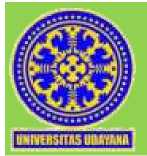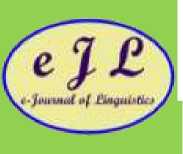The Use of Color Term in Branding, a Multimodality Case
on

e-Journal of Linguistics

Available online at https://ojs.unud.ac.id/index.php/eol/index
Vol. 15, No. 1, January 2021, pages: 40-46
Print ISSN: 2541-5514 Online ISSN: 2442-7586
https://doi.org/10.24843/e-jl.2021.v15.i01.p05
The Use of Color Term in Branding, a Multimodality Case
Ni Kadek Ari Armaini1
Bali-Indonesia
Email: ariarmaeni76@gmail.com I Made Rajeg2
Bali-Indonesia
Email: made_rajeg@unud.ac.id
Article info
Received Date: August 31, 2020
Accepted Date: Sept., 7, 2020
Published Date: January 31, 2021
Keywords:*
branding, color term, Badung Regency, tourism industry, multimodality
Abstract*
Branding is the activity that involving pictures, shapes and colors reflecting the excellence of a product. In every brand colors play important role to make a brand stands out. The color was chosen in order to represent certain meaning and called as color term. the purpose of this article is to find out the color chart that is used in order to determine the meaning of each colors as well as the colors represent in the branding. The Badung Regency Tourism Branding is one of branding that play with color terms. This brand was analysed by applying the psychological aspects of color (Birren,2013) compare with the chart proposed by the Tourism Minister of Republic of Indonesia and the multimodality definition proposed by Kress and Van Leeuwen (2001). The analysis showed that the brand applying more than one semiotic modes and each modes shows certain meaning.
Van Leeuwen (2005) cited in Yang Yang stated that “multimodality means the combination of different semiotic modes – for example, language and music – in a communicative artifact or event.” In other words, multimodality discourse involves the interaction of multiple semiotics resources such as language, gesture, dress, architecture, proximity lighting, movement, gaze, camera angle, and so on. It means that language will represent the world in narrative while image illustrate the displayed world.
In their article, Kress and Van Leeuwen (2001) also argued that color is also a semiotic mode since a color can have different meaning, it can symbolize different things depend on the context. Color as well as lay out, the font shapes, the picture, etc. they all are semiotic modes that can be interpreted in many ways depend on the context and situation. In multimodality communication, modes work individually as well as collectively. This means, modes produce meaning in themselves and through their intersection or interaction with each other.
Since this study focused on the semiotic mode that is used in the brands it is interesting to find out the semiotic mode involved and the color term used in the brand and the meaning implies in each semiotic modes involved.
Color psychology is the study of colors in relation to human behavior. It aims to determine how color affects the day and the decisions of people. Research on the psychological aspects of color is difficult for the mare reason that human emotions are non-too stable and the psychic make up of human being varies from person to person (Birren,2013).
However, the psychological effect of colors in human being perceptions can be shown as bellow, according to Modern American Color Association:
|
COLOR |
MENTAL ASSOCIATION |
OBJECTIVE ASSOCIATION |
SUBJECTIVE IMPRESSION |
|
Red |
Hot, fire, heat, blood |
Passionate, exciting, fervid, active |
Intensity, rage, rapacity, fierceness |
|
Orange |
Warm, metallic, autumnal |
Jovial, lively, energetic, forceful |
Hilarity, exuberance, satiety |
|
Yellow |
Sunlight |
Cheerful, inspiring |
High spirit, health |
|
Green |
Cool, nature, water |
Quieting, refreshing, peaceful, nascent |
Ghastliness, disease, terror, guilt |
|
Blue |
Cold, sky, water, ice |
Subduing, melancholic, contemplative, sober |
Gloom, fearfulness, furtiveness |
|
Purple |
Cool, mist, darkness, shadow |
Dignified, pompous, mournful, mystic |
Loneliness, desperation |
|
White |
Cool, snow |
Pure, clean, frank, youthful |
Brightness of spirit, normality |
|
black |
Neutral, night, emptiness |
Funeral, ominous, deadly, depressing |
Negation of spirit, death |
The Tourism Ministry of Indonesia has released a guideline on Indonesia’s Tourism Branding; Wonderful Indonesia, especially the use of colors and its meaning as below:
|
COLOR |
CATEGORY |
MOOD |
|
Purple |
Sensory Wonder: food & drink, wellness, and entertainment. This wonders experience should only be conveyed when communicating about Indonesia’s leisure’s that can be experienced with the 5 senses of the human body. |
Creativity, Natural Friendliness and Alignment |
|
Green |
Natural Wonders: marine, mountains, and greenery. This wonders experience should only be conveyed when communicating about Indonesia’s amazing nature. |
Imagination, Belief System, Physical and Mental Unity. |
|
Orange |
Cultural Wonder: arts, culture, and heritage. This wonders experience should only be conveyed when communicating about Indonesia’s rich traditional cultures and activities. |
Innovation, Spirit of Rejuvenation, and Openness. |
|
Blue |
Modern Wonder: city life, technology, and transportation. This |
Universality, Peacefulness, and |
wonders experience should only be conveyed when communicating about Indonesia’s modern and advanced civilization.
Determination
Balance, Common Sense, and
Practical Matters
Magenta Sports, adventure, and exploration. This wonders experience
should only be conveyed when communicating about Indonesia’s unique and adventurous sports activity
This research will be focused on the meaning implied by the colors used in Badung Regency tourism branding and the value of tourism destination in Badung regency which are implicitly represent by the brand colors. The result will be analyzed qualitatively in order to make the explanation clearer
The data taken for this research are taken from the tourism brand created by Tourism Office of Badung Regency in 2017. The data will be analyzed qualitatively based on the brand’s detail description on Brand Strategy’s report and also compared with the Indonesian Tourism Branding Application Guidelines proposed by the Tourism Ministry of Indonesia Republic, as the master guideline for all the tourism branding in Indonesia.
Branding is important because branding is a way of creating a name, symbol or design that is easily identifiable as belonging to the company, so that it will helps to identify the product and distinguished it from other product and services. Tourism is considered to be an industry according to Tourism Law No. 10 of 2009 since tourism is tourism business collections which are interrelated in order to produce goods and/or services for fulfillment tourist needs.
One of tourism branding that exists in Indonesia is Badung tourism branding, which is involving text, shapes, and colors. Each color which is applied in the logo has certain meaning that is believed will affected people’s mood. The branding can be seen as below:
^ badunρ
O
The brand involving some colors, which are red, blue, green, orange, yellow, black and white. Each color was believed will provoke certain mood to the eyes of the viewers.
-
1.1. The Color psychology implies in Tourism Branding of Badung Regency
Color psychology is the study of colors in relation to human behavior. It aims to determine how color affects the day and the decisions of people. When the colors which are use in this logo are compare with those which are exist in the Modern American Colors Scheme, it can be seen as follows:
|
Color |
Badung Regency Tourism Branding |
Objective Association by Modern American Colors |
Tourism Ministry’s Guideline |
|
Red |
Energetic and love |
Passionate, exciting, fervid, active |
Balance, Common Sense, and Practical Matters |
|
Blue |
Self esteem, inovation, expressiveness |
Subduing, melancholic, contemplative, sober |
Universality, Peacefulness, and Determination |
|
Green |
Peaceful, balance, and harmony |
Quieting, refreshing, peaceful, nascent |
Imagination, Belief System, Physical and Mental Unity. |
|
Orange |
Simplicity, sincerity, and |
Jovial, lively, energetic, |
Innovation, Spirit of |
|
spiritual forceful Rejuvenation, and Openness | |
|
Yellow |
Warmth, dinamic, literature, Cheerful, inspiring - and wisdom |
|
Black and white |
Reliable and intelegent Not exist - |
From the table above it can be seen that:
-
1. The color red in Badung’s branding adopted the objective association proposed by Modern American Colors Scheme since energetic has almost the same meaning as passionate, and energetic can also be said as active.
-
2. The color blue in Badung’s branding meaning of self esteem, inovation, and expresiveness can be said as the result of determination as written in the Ministry’s guidelines.
-
3. Green in Badung’s branding has adopted the association propose by Modern American Colors scheme which are peaceful which will resulting the balance and harmony mood
-
4. Orange has the same meaning as simplicity, sincerity and spiritual as well as jovial
-
5. Yellow color does not exist in Tourism Ministry’s guideline but it has the same
association proposed by the Modern American Color’s chart, which are cheerful and inspiring. It takes wisdom, literature, and dynamic mind in order to be inspired.
-
6. Black and white is a unique color, the signature of Balinese color. It can be found anywhere in Bali as the symbol of balance of bad and good, and it take beliefs and intelegent to determine them. This color is an addition in order to give Balinese characteristic in the branding.
Most of the colors used in Badung Regency’s Tourism Branding have been followed the guideline proposed by the Indonesian Tourism Ministry, however since this branding is made for the shake of international market share, some of them followed the association proposed by the Modern American Colors chart.
-
1.2. Multimodality Analysis on Tourism Branding of Badung Regency
Multimodality is a theory of communication and social semiotics. Multimodality is the use of several modes to create a single artifact. Multimodality study can be found in many cases since it involving many semiotics symbols from written, pictures, audio, even audio-visual. Branding in marketing has a close relation with multimodality as well, since it has more than one semiotic mode.
In Badung regency’s Tourism Brand there are several semiotic modes are applied. There are picture, text, and also color. Each mode has its own implicit meaning. Semiotic modes in the form of picture are Meru, sun, and silhouettes of waves. Meru or the shapes of temple which means the symbol of the universe and also to show the world that Badung exist in Bali which famous with the icon of Island of thousand temples and also to signify that Badung tourism development is based on Hindu Philosophy and culture. The sun implies that tourism is the main source of Badung Regency prosperity and source of life of its people. Besides, sun set is the icon of Badung which is very popular all around the world. The silhouettes of waves imply the dynamic movements of tourism in Badung Regency.
The text ‘Badung the soul of Bali’ implies that Badung Regency is the main destination in Bali and the main contributor for all the tourism development in Bali since Badung donates some of its income to other regency in order to help them to preserves and maintain their tourism destination.
Colors used in Badung Regency’s tourism branding also has their own symbolizes according to the Indonesian Tourism Ministry Guidelines on tourism branding. Each colors has its own categories that will expose the strength of each region tourism destination. The colors
used in Badung regency’s tourism branding such as red, blue, green, orange, yellow, black and white represent Badung regency’s strength in tourism.
-
1. Red is the symbol of energetic, fun, courage and love. It represents the strength and the signature product and services provide by Badung Regency which are festival, leisure, business, event, shop, and food. According to the thematic soul experience proposed by Tourism authority of Badung Regency, it represents food, shop, and fun soul experience.
-
2. Blue is the symbol of confident, innovative, and expressive which have the thematic soul experience as a lifestyle, modern, vibrant soul experience. It represents the product and services available in nightlife, culinary, spa, villas, and club.
-
3. Green is the symbol of peace, balance, and harmony which have the thematic soul experience as nature soul experience. It represents beach, mountain, rice field, and farm which are exist in Badung Regency.
-
4. Orange is the symbol of humble, sincere, and spiritual which have the thematic soul experience as the heritage soul experience. It represents the Badung signature such as the temples, arts, ceremonies, and traditions.
-
5. Yellow is the symbol of warmness, dynamic, story-telling and wisdom which have the thematic soul experience as the culture soul experience. It represents performance, arts, and eco-village.
-
6. Black and white is the symbol of reliable and smart which have the thematic soul experience as the manmade, the technology soul experience It represents the airport that exist in Badung, the icon of modern Bali tourism; The Garuda Wisnu Kencana statue, and also the Bali Mandara Highway.
The colors applied in the Tourism Brand of Badung Regency represent functional and positional spectrum of Badung regency since it is the only regency with the most complete tourism portfolio. It provides customers needed from personal to business until international needed.
-
- Novelties in this study is the use multi semiotic modes in a brand including the involving of color psychology in creating tourism branding that comparing the color psychology of Modern American Color Association chart and the Indonesian psychology of tourism branding proposed by the Tourism Ministry of Republic of Indonesia Republic.
-
- Tourism branding is created in order to create a signature of tourism resources that exist in Badung Regency. Therefore the brand must imply the shapes, texts, and the color psychology’s which are understood internationally, especially to the westerner, in order to attract them to come to Badung Regency.
Branding is the mirror of a product identity that will differentiate certain product from the others. Tourism in Bali is considered to be an industry that will bring prosperity to its people. The purpose of the branding for tourism in Badung Regency is to facilitate Badung to set a new standard quality of product and service, to establish Badung as customer valued brand, and also to inject brand essence to people that support the vision.
From the analysis it can be conclude that there are some semiotic modes that are applied in the Tourism Brand of Badung Regency. They are the form of shapes, text, and also color. Each of semiotic modes has its own meaning implies the strength of tourism in this regency. The shapes involved imply the base of tourism development in Badung Regency and also the
identities of it. The text signifies the contribution of Badung regency in the tourism development in Bali Island.
The meaning of color term express in the Badung Ragency's tourism branding can be devided into into six (6) experience taht can be found in Badung Regency. They are:
-
1. Fun soul experience such as festival, leisure, business event, shop, and food
-
2. Vibrant soul experience such as nightlife, culinary, spa, villas, and club.
-
3. Nature soul experience such as beach, mountain, rice field, and farm
-
4. Heritage soul experience such as temples, arts, ceremonies, and traditions
-
5. Culture soul experience such as performances, arts, and eco village
-
6. Manmade technology soul experience such as airport, Garuda Wisnu Kencana landmark, and Bali Mandara Highway.
Those souls represent the richness, the diversity, and also the uniqueness tourism attraction that can be found in Badung Regency.
Acknowledgements
The author wishes to thank all those who have given valuable contributions to this research so that the results can be disseminated through publication, especially to my supervisor : Prof. Dr. Ida Bagus Putra Yadnya for their advices to deepen the analysis and the presentation of this research.
References:
Darmawan. Yoke.2018.Laporan Kegiatan Brand Strategy.Public Relation Marketing
Communication Human Resources Branding Consultancy.Denpasar
Faber.Birren.2013.Color Psychology and Color Therapy.Citadel Press. New Jersey
Kress G, and Van Leeuwen T.2001.Multimodal Discourse:The Modes and Media of
Contemporary Communication.London,Routledge
Ministry of Tourism Republic of Indonesia.2016.Pedoman Aplikasi Brand & Design.Brand and
Design Application Guidelines.Ministry of Tourism Republic of Indonesia.Jakarta
Peraturan Bupati Badung Nomor 54 Tahun 2018 tentang Branding dan Tagline Pariwisata
Kabupaten Badung
Undang Undang Republik Indonesia No. 10 Tahun 2009 tentang Kepariwisataan
Yang. Yang.2016.A Social Semiotic Approach to Multimodal Discourse of the Badge of Xi’an
Jiaotong University.School of Foreign Languages, Chan’an University. China
https://www.tailorbrands.com/logo-maker/what-is-a-logo
LearnMarketing.net. Brand Definitions, Brand Strategies, Brand Equity.
https://www.learnmarketing.net/branding.htm
Biography of Author


Biography of Author 1
Mrs. Ni Kadek Ari Armaeni S.S. got her bachelor’s degree in English literature from Udayana University, Faculty of Letters in 2000. After graduated, she started to work as an honorary staff for the government in Badung Regency. In 2005 she passed the selection and being appointed to become a civil employee for the government in Badung Regency. From 2017 until now she was appointed as the head of Tourism Market Analysis Section in Badung Regency Tourism Office
Biography of Author 2
I Made Rajeg is a senior lecturer in linguistics at the Faculty of Arts Udayana University. His research interests include lexical semantics, corpus linguistics, metaphors, and discourse. His publications can be tracked at this link:
https://udayananetworking.unud.ac.id/lecturer/publication/1817-i-made-rajeg
Discussion and feedback